SEO Tools: 40 Free Tools and a Look at Profound Strategy’s Favorites
The web is practically flooded with SEO tools. Some are free, and some are very expensive. Some perform one simple task, and others require their own training guides.
Where do you start?
Our Profound Strategy team of SEO analysts, strategists, and content editors has used a variety of tools over the years, and reduced our list of favored tools through trial and error. Our most preferred tools are at the bottom of this piece, but all the SEO applications listed below are good tools.
Remember, first and foremost, to start with your need. It’s easy to get distracted by all the amazing SEO tools that are available, but what insights do you need or what problem needs fixed? (Then, maybe, investigate some really great tool suites and other nifty tools you didn’t know you needed.)
We’ve broken this list down according to need:
- SEO Tool Suites
- SEO Analytics Tools
- Competitive Research Tools
- Crawling and Indexing Tools
- SEO Content Tools
- Keyword Research Tools
- SEO Link Tools
- Rank Tracking Tools
- Site Speed Tools
- Other Technical SEO Tools
- Profound Strategy’s Favorite SEO Tools
Working on a technical SEO audit? A lot of these tools will help. If you need a technical SEO audit with expert insights and actionable, prioritized recommendations, we’re here to help. Learn about a technical SEO audit. →
SEO Tool Suites
Some SEO tools concentrate on very specific elements of SEO strategy, but there are several tools comprising an entire suite of useful applications. These will handle most SEO tasks, and are the only tools on this list that are not free.
1. Ahrefs
Ahrefs is one of the most comprehensive SEO suites, containing backlink analysis, auditing capabilities, competitive analysis, and URL rankings, among other features.
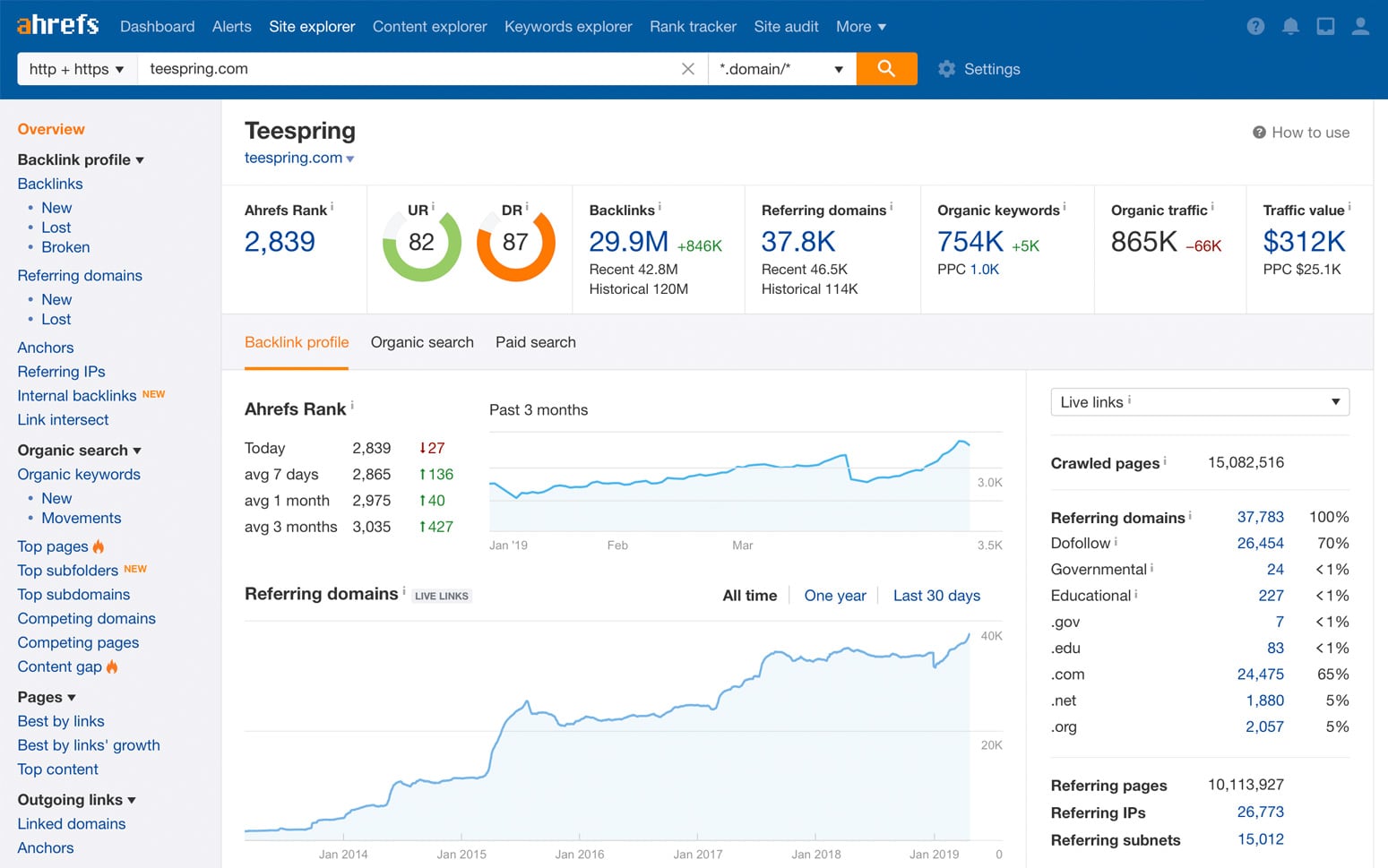
Ahrefs is a particularly accurate link auditor, because it has an index based on over one trillion website connections. Ahrefs uses a bot to sift through this enormous index and highlight actionable link opportunities for a user’s profile. Furthermore, Ahrefs puts forward fresh keywords and content topics that are already pre-validated.
2. Moz
Moz is another conglomerate of valuable tools. Keyword research, link analysis, audience analysis, auditing, crawling, and site rank are all within Moz’s wheelhouse. The Moz Keyword Explorer has one of the largest keyword databases available, combining the results of Google Ads and Google News.
From this data, Moz determines the highest performing keywords in search engine results pages (SERP) and prioritizes them in the best order for the site in question. Moz also has a link module with inherent competitive analysis. Besides keyword and link features, the Moz suite conducts social media, location, and domain analysis.
3. SEMrush
SEMrush is possibly the most renowned keyword research tool because of its expansive database, which covers more than 46 million domains and 120 million keywords. Enter a URL into SEMrush, and the tool displays every keyword driving organic traffic to that URL, subdomain, or domain.
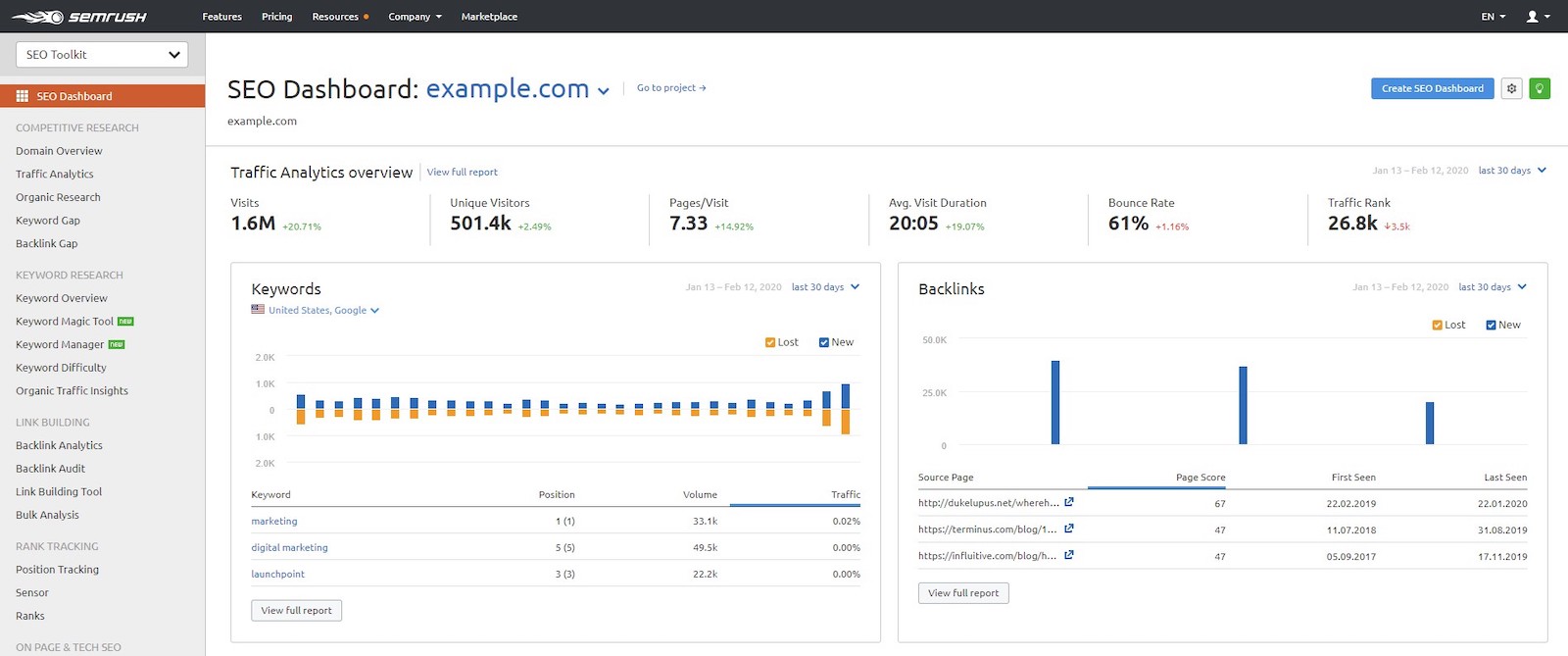
Outside of keywords, SEMrush pinpoints pages of competitors’ sites that produce the maximum search engine traffic. SEMrush optimizes advertising tactics by finding the copy of cost-per-click (CPC) and Google Ads information. Furthermore, SEMrush monitors current and historical search engine page ranking against main competitors, as well as their competitors.
SEO Analytics Tools
SEO analytics tools help companies evaluate if their SEO has generated the growth desired. If organic traffic, CTRs, or conversions haven’t improved, an SEO analytics tool can not only verify these trends, but often provide some insight into why.
4. Google Analytics
Google Analytics is the most widely used SEO analytics package, supplying deep knowledge as to how an audience finds and uses a website. Google Analytics tracks dozens of attributes and behaviors of the people who visit each site.
In Google Analytics, marketers can see the geographical location from which users are accessing the site, how long someone was on each page, and how many clicks it took for them to get there.
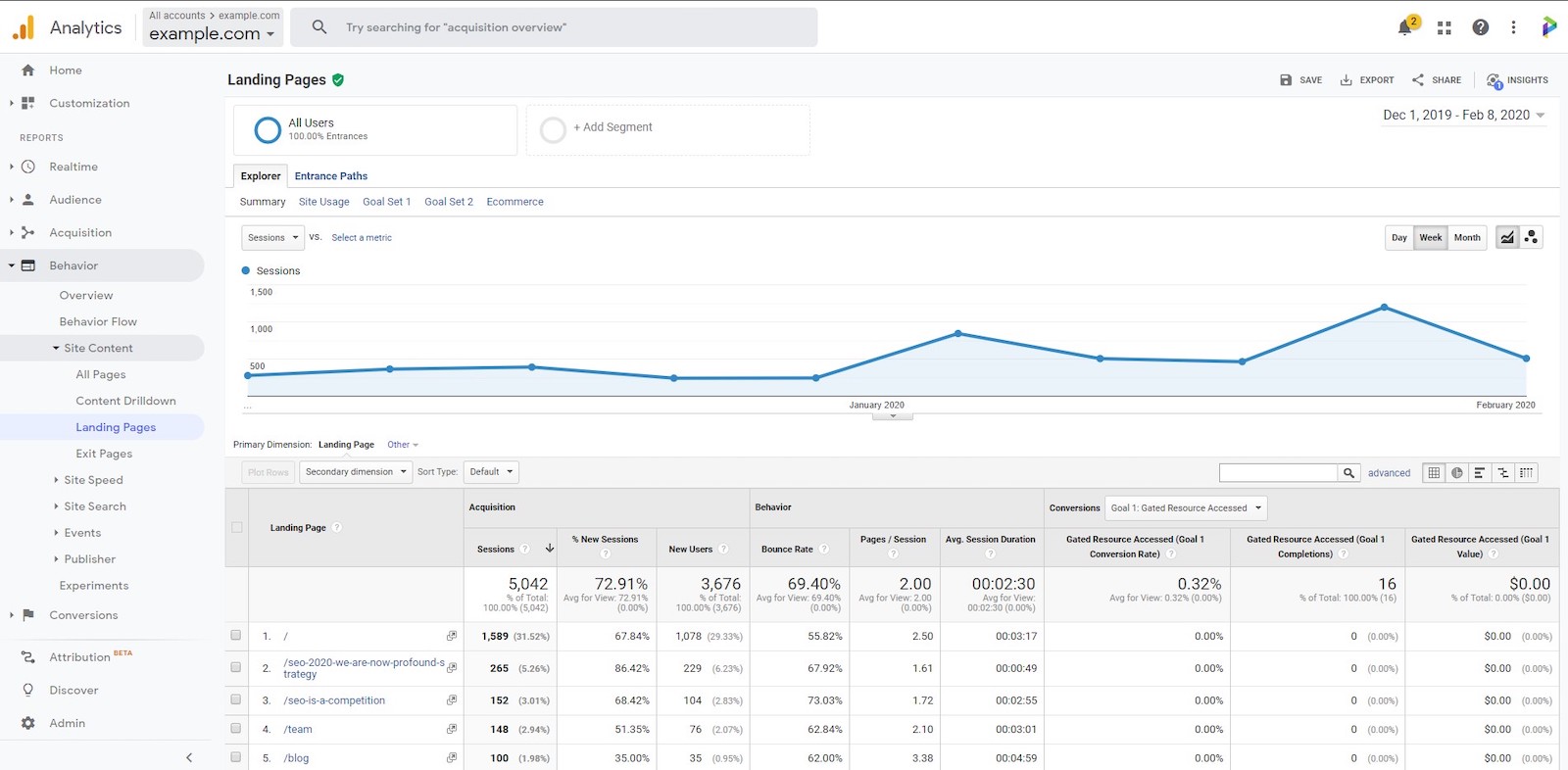
Analytics will track return on investment by following a Google Ads account and anything else that is tagged, such as PR campaigns or social media. Yet another bonus is that Google Analytics integrates perfectly with other Google products, such as Search Console, Data Studio, PageSpeed Insights, and Optimize.
5. Google Data Studio
Good data is one thing, but you need to be able to share that data in a meaningful way. Google Data Studio allows users to consolidate data from various sources, compile it into a visualization, and share the final product with peers and managers.
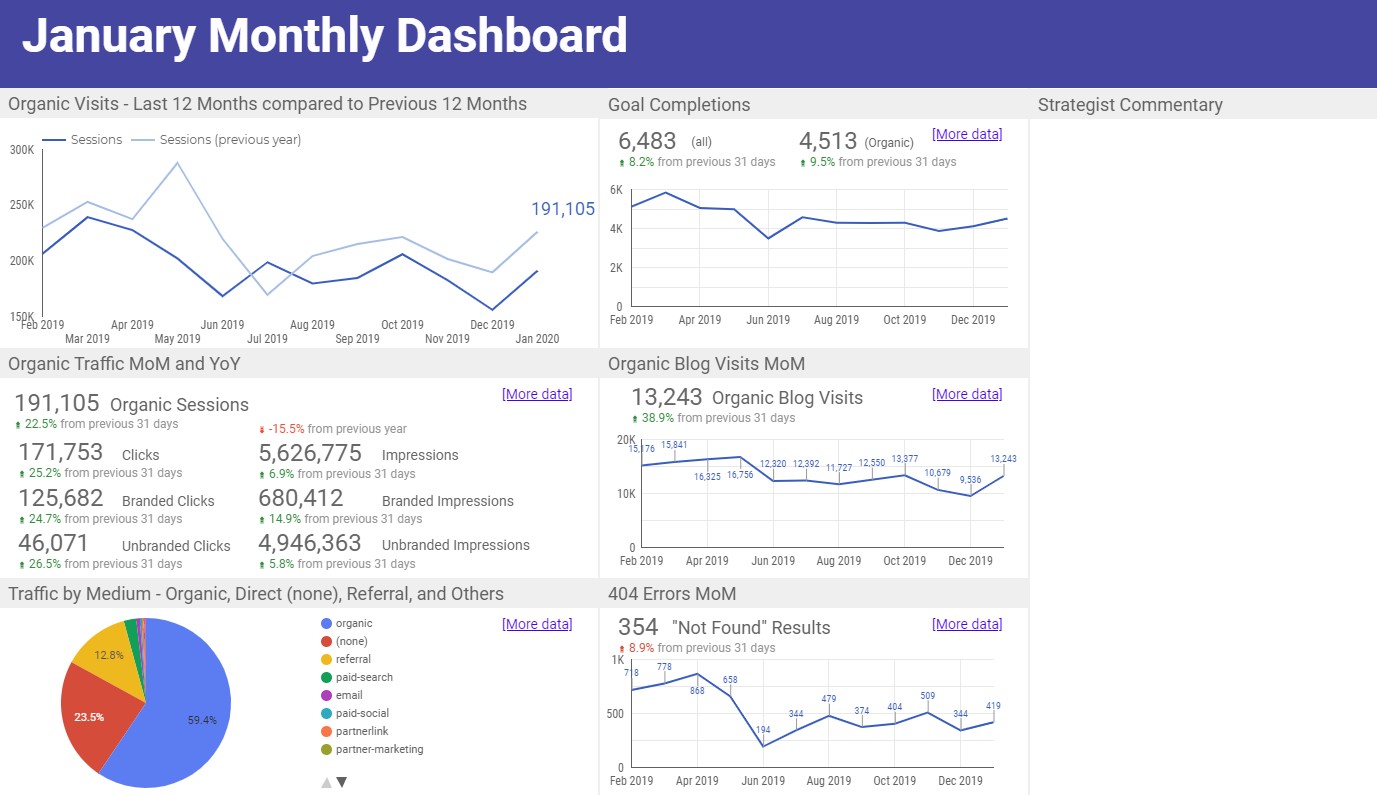
Data Studio offers many free dashboard templates to choose from, and they are all fully customizable. These reports are dynamic, meaning that any time there is a change to the numbers, the reports automatically update. Since the reports are native to Google, they have the same sharing permissions as Google Sheets and Google Docs.
6. Google Search Console
Google Search Console is likely one of the most practical and user-friendly, free analytics tools. Search Console acts like a fake user, demonstrating how a site looks to the average visitor. It tracks what queries users type, how often a site appears in the results for those queries, and how often users actually click on the site.
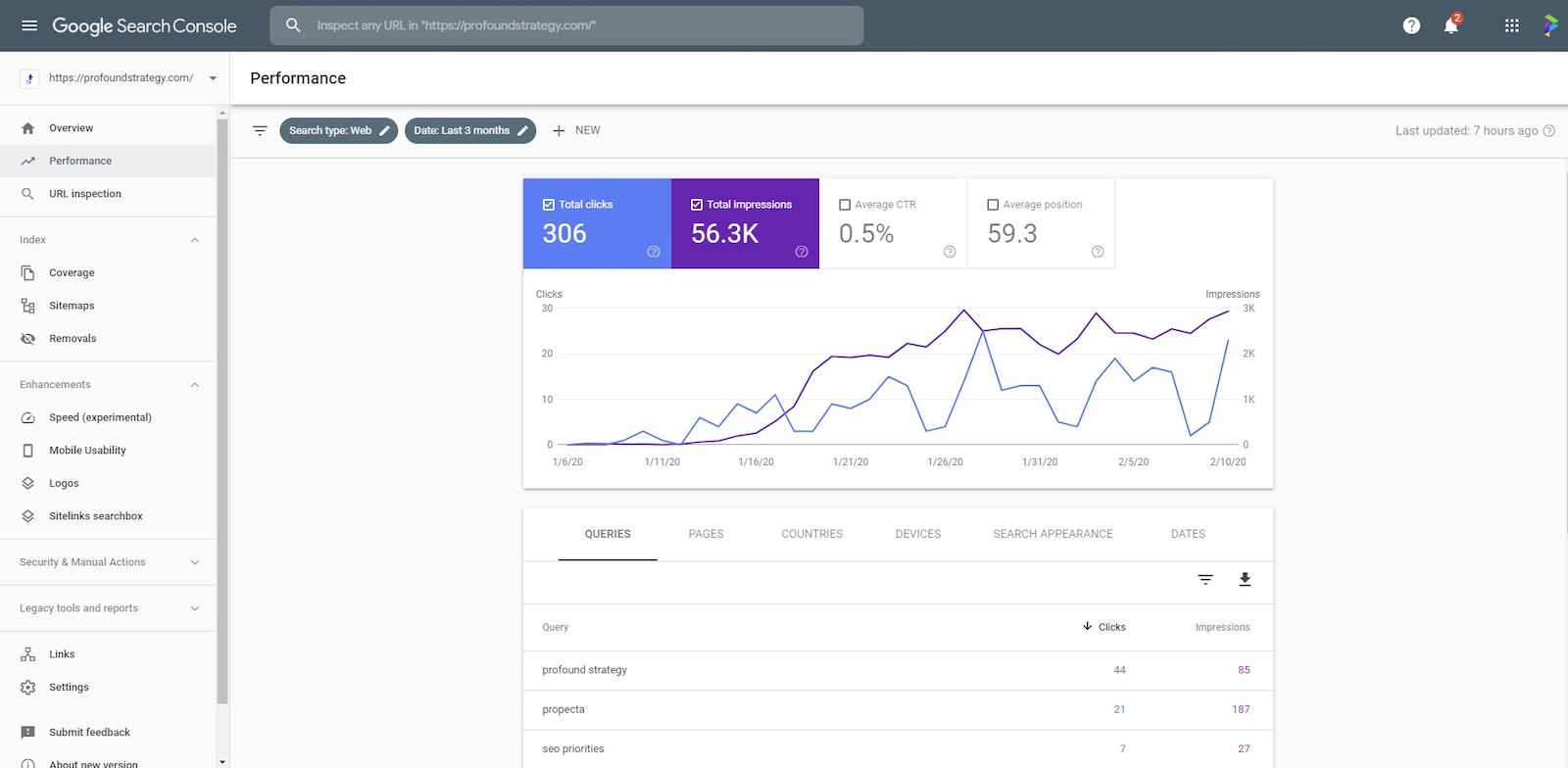
Search Console has built-in alerts and troubleshooting for spam, mobility issues, site speed issues, or other problems Google discovers. Search Console also monitors site traffic and is regarded as providing the most dependable information on crawling and keywords. Based on that data, lists of keywords can be augmented or adjusted to better accommodate a target audience.
7. Bing Webmaster Tools
Similar to Google, Bing offers a full range of search and site analytics. Bing Webmaster Tools provides crawling data, keyword reports, and keyword research functionality that updates every 30 days. Marketers can use these features to determine what drives clicks and impressions.
Moreover, Bing Webmaster Tools is customizable, enabling users to select crawling patterns that match certain promotions or off-peak hours. Bing’s SEO reports also propose suggestions for sites. Users can click on each Bing-recommended best practice to read more about why and how they should implement it and how it will benefit their overall SEO strategies.
Competitive Research Tools
Modern SEO is about more than rote optimizing: it’s a competition. Savvy digital marketers are looking at SERPs competitively and comparing their sites to top organic competitors, as well as business competitors.
8. BuzzSumo
BuzzSumo is a Chrome extension that reveals how often a site is shared on particular forms of social media versus others. It can help users learn what content is trending and send an alert when particular keywords on a list are mentioned on other sites.
BuzzSumo also has a “View Sharers” feature, which notifies users when content is shared on Twitterーa great start to an outreach campaign. This is a simple tool that measures competitor’s key metrics to show what networks content performs well on and who is actually sharing it. Companies can then see how they compare to their competitors with this information.
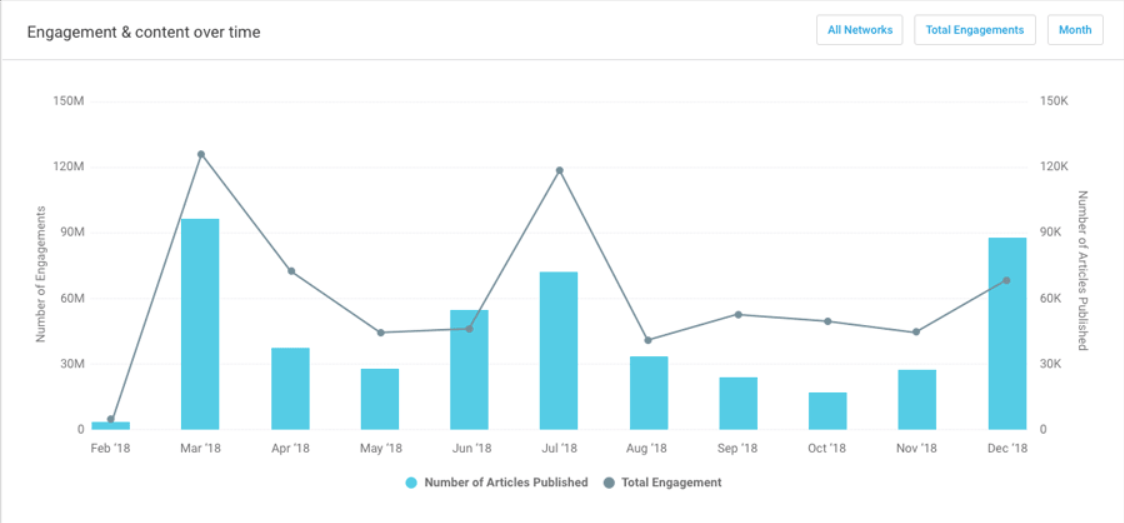
9. SimilarWeb
There are countless factors by which to evaluate a site against a competitor’s. SimilarWeb assesses competitors’ marketing channels, engagement, location, top pages, and traffic. It can also be used to uncover other websites that are closely-related to the user’s. In the free version, users can compare up to two websites at a time.
10. Wappalyzer
Understanding the competition’s technology stack can provide inspiration for a user’s own setup. Wappalyzer is a free tool that tells what technology a site is using.
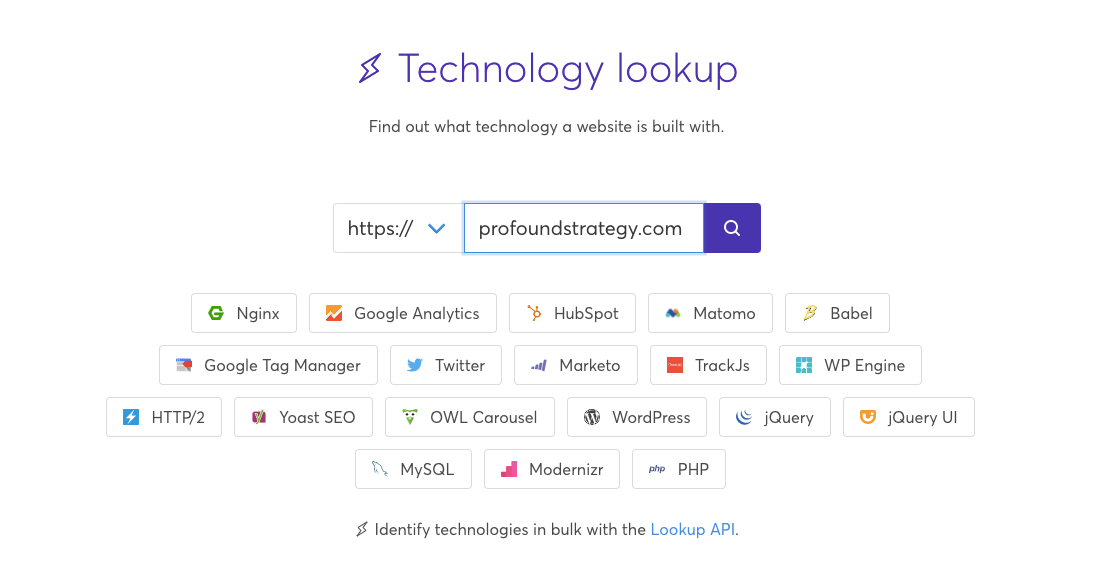
Wappalyzer is open-source and can distinguish between over 1,200 technologies used on websites. Some of these technologies include: server software, ecommerce platforms, analytics tools, and even systems that manage the competitors’ content. This can help to inspire a better set up of SEO tools and configurations for a company, or to help find ways to increase site performance.
Crawling/indexing
Crawlability and indexing are how search engines read websites and catalogue what information is on which pages. Keeping site architecture and on-page links up-to-date helps make this process easier. It also helps improve the user experience by making sites easier to navigate.
11. Beam Us Up
Beam Us Up is an application that rapidly crawls sites, for free, without any limitations. Within the app, users can sort, segment, filter, and export site audit data instead of copy and pasting SEO crawl results into Excel. Beam Us Up also natively tracks the most frequent SEO errors and flags duplicate content.
12. Redirect Path
Redirect Path is a plugin that displays the header and redirect paths for each URL users visit.
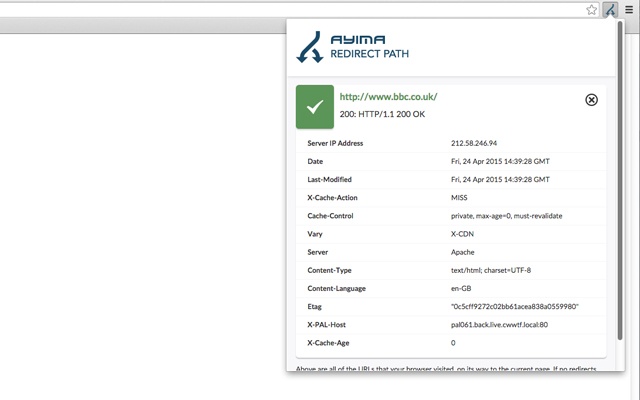
The app also warns of issues with a site that may not be instantly obvious, such as meta and Javascript redirects, as well as 301, 302, 404, and 500 HTTP status codes. This is a relatively simple way to conduct a quick SEO audit for links and redirects and maintain a site’s health. Redirect Path also shows a site’s server IP address and other HTTP headers, such as caching.
13. Screaming Frog
Perhaps the most popular desktop-based SEO crawler, Screaming Frog allows up to 500 URLs per crawl for free (and more for a paid service). This crawler can find server errors, broken links, and page redirectsーall issues that can discourage engagement and diminish site performance.
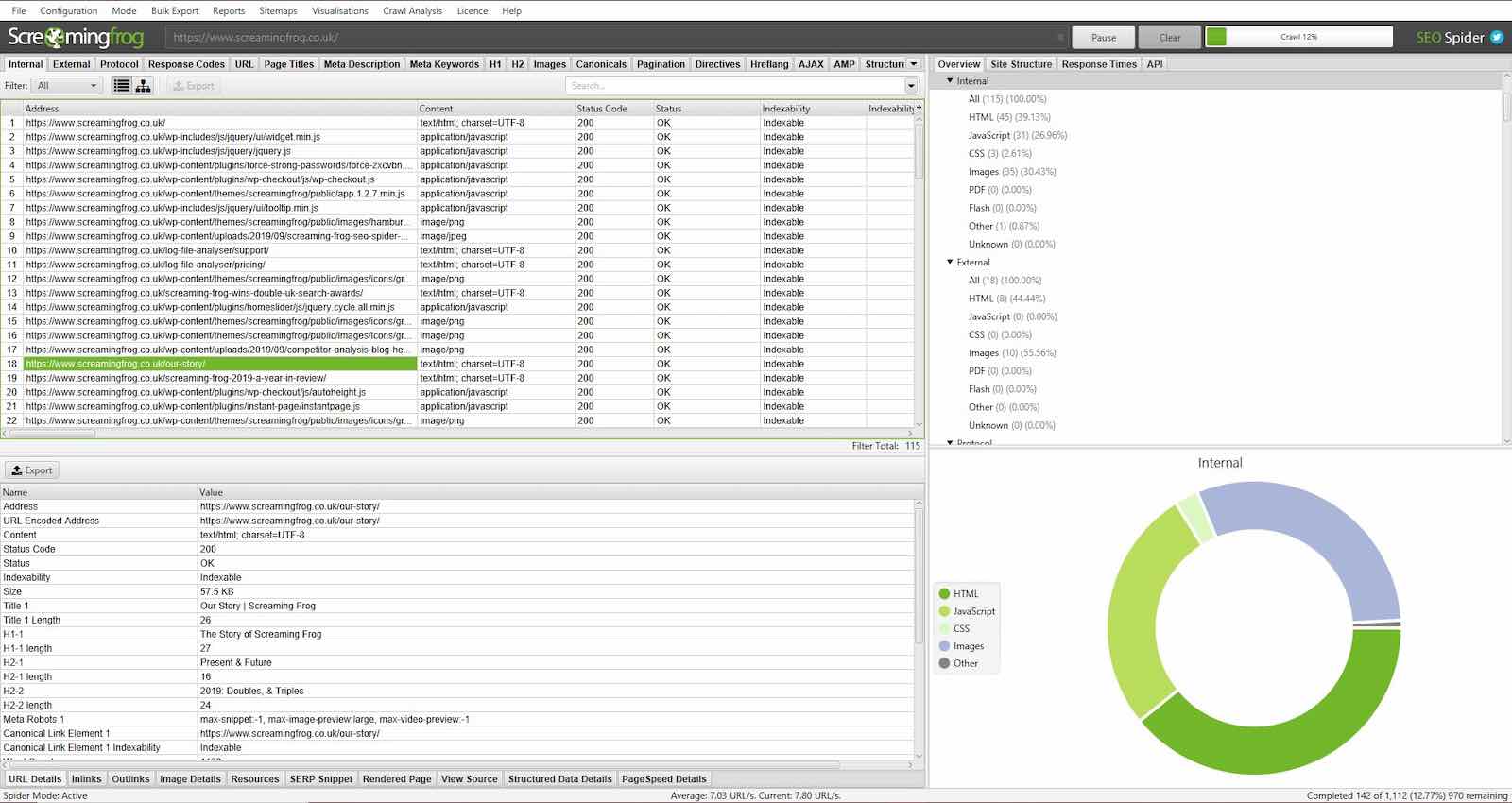
On top of that, Screaming Frog can find missing, overly lengthy, or duplicate meta descriptions and page titles.
Last, but not least, Screaming Frog integrates seamlessly with Google Search Console, Analytics, and PageSpeed Insights, casting an even wider net for insights.
SEO Content Tools
Editing tools on an SEO tools roundup? Absolutely! Outstanding SEO content is what drives consistent, reliable organic traffic growth, and content tools help to make sure that content is not plagiarized, easy to read, and error-free.
14. Copyscape
Extraordinary content is original. Copyscape ensures that a site’s content is nothing like anything else on the web. Its free plagiarism detection service sweeps the web for duplicate content and emails users whenever writing similar to their content appears online. Other features of Copyscape include: WordPress integration, warning banners for a user’s site, indexing, copy/paste checks, and an API.
15. Grammarly
Good content is also error-free. Grammarly automatically recognizes and corrects spelling and grammar errors, but also offers improvements to word choice and punctuation. Users can either copy/paste text into Grammarly’s free editor or install Grammarly’s free browser extension.
Grammarly also has a tone detector, which can help a team of content creators hone in on a consistent brand voice. It even has a keyboard for iOS or Android phones, for writing and editing on-the-go.
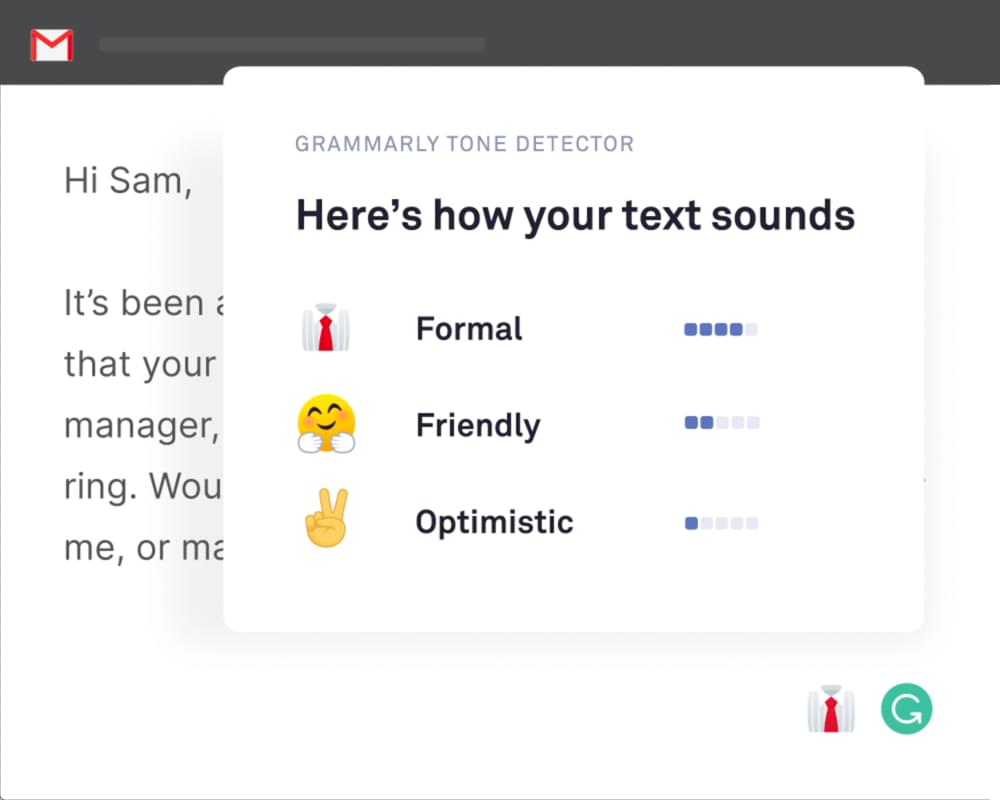
16. Hemingway App
Think of Hemingway App as Grammarly for style. Hemingway App focuses on simplifying sentence structure and fluency by pointing out where content is too dense.
It also uses an Automated Readability Index that estimates a difficulty level for the writing. This is also especially convenient for a team of content creators who need to align content around a consistent brand tone and voice.
17. QueText
Another tool to guarantee original content is QueText. This app leverages DeepSearch, an algorithm that finds sources that pirate content. QueText’s DeepSearch does not just search for common words or phrasesーit looks for contextual plagiarism as well.
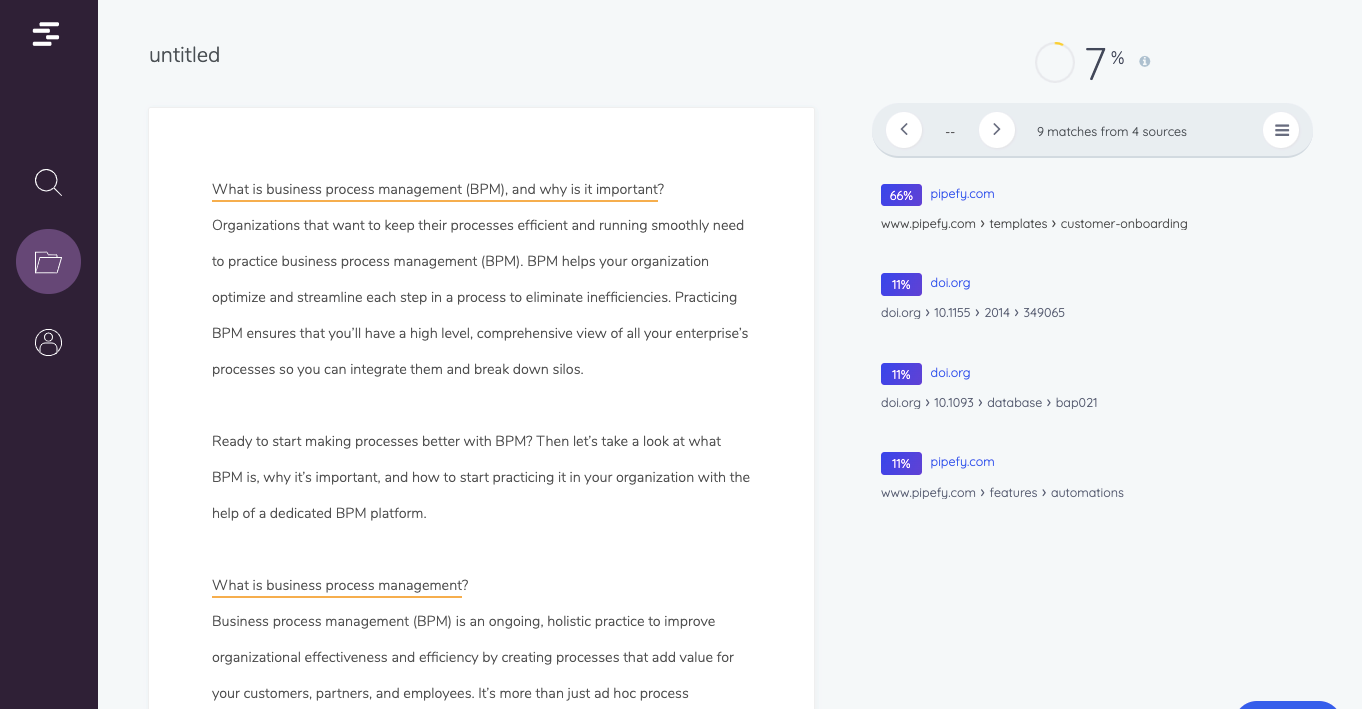
Need some extra help with your SEO content strategy? A Profound Strategy Advanced SEO Content Audit can jump-start your efforts. Get clear visibility into content gaps and opportunities, as well as prioritized, actionable insights on how to get started. Learn more →
Keyword Research Tools
Keyword research is the first step to an SEO content strategy. While keywords are no longer enough to build an entire SEO strategy on, it is still crucial to get this first step right. A handful of good SEO keyword research tools make it possible.
18. Answer The Public
One way to think about keywords is to engineer the same questions than an ideal customer might have. Answer The Public is a question scraper that capitalizes on Google Autosuggest.
Users simply type a keyword into Answer The Public to get a dump of potential questions and other keyword suggestions. These lists can be downloaded as .csv files and quickly added to a keyword set.
19. Keywords Everywhere
Keyword research is an ongoing activity. To facilitate this process, users can download the Keywords Everywhere Chrome and Firefox extension.
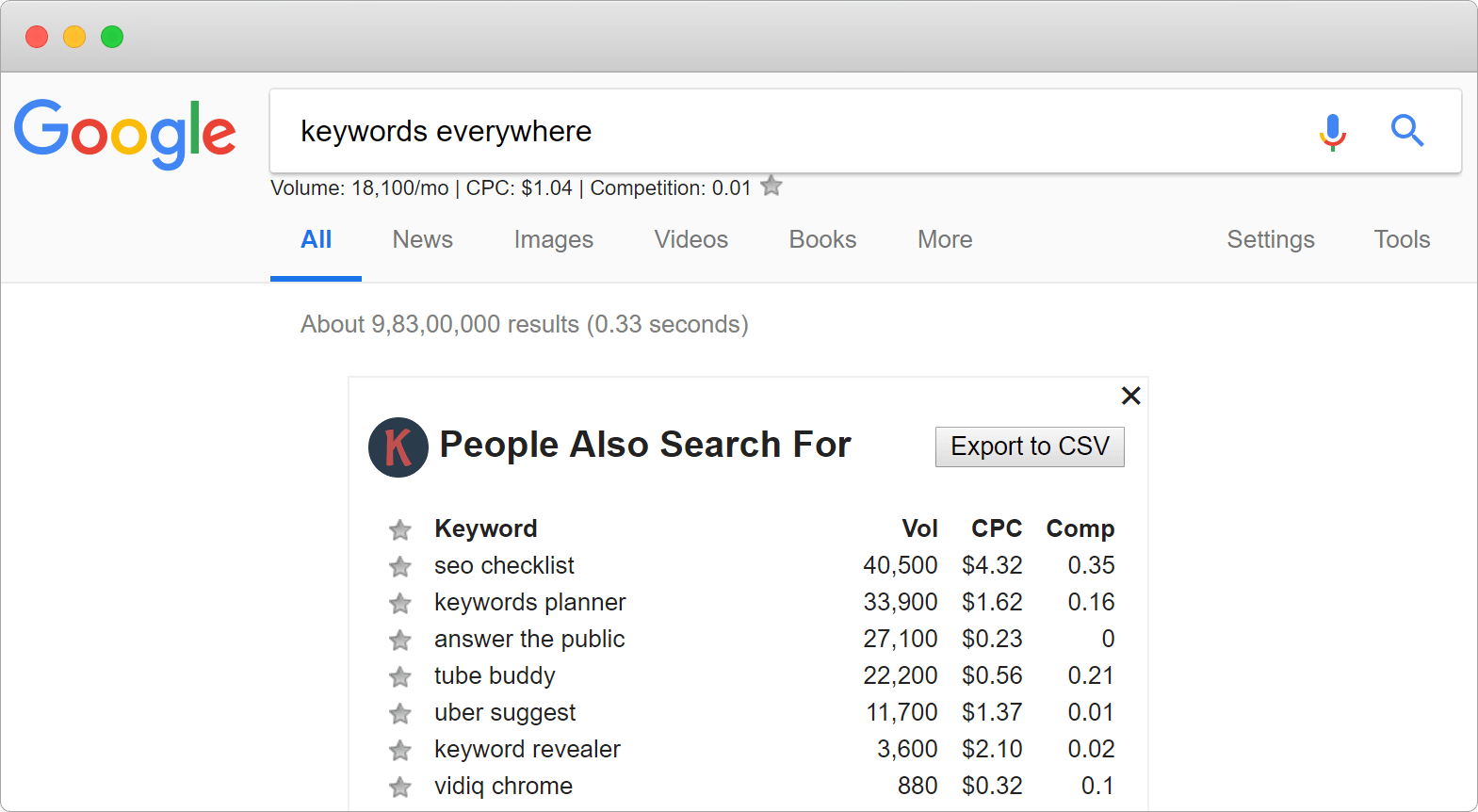
This app tracks search volume, cost-per-click advertising (CPC), and competition data on the sites users visit. From this data, Keywords Everywhere generates new, related keywords.
20. SERPROBOT
Being at the top of SERP results is essential to winning organic search traffic. SERPROBOT delivers reports on how well a user’s site is performing on SERPs for every keyword.
SERPROBOT is free for up to five keywords without even creating an account. After signing up for SERPROBOT, users get access to alerts for SERP rank changes, competitor site research, unlimited keyword analysis, and more.
21. Ubersuggest
Ubersuggest was the first tool to leverage Google Autocomplete data. Now, Ubersuggest can accumulate long-tail keywords from Google Suggest, YouTube, and other competition. Apart from keyword recommendations, Ubersuggest shows the average number of links on highly ranked sites and their search volumeーall for free.
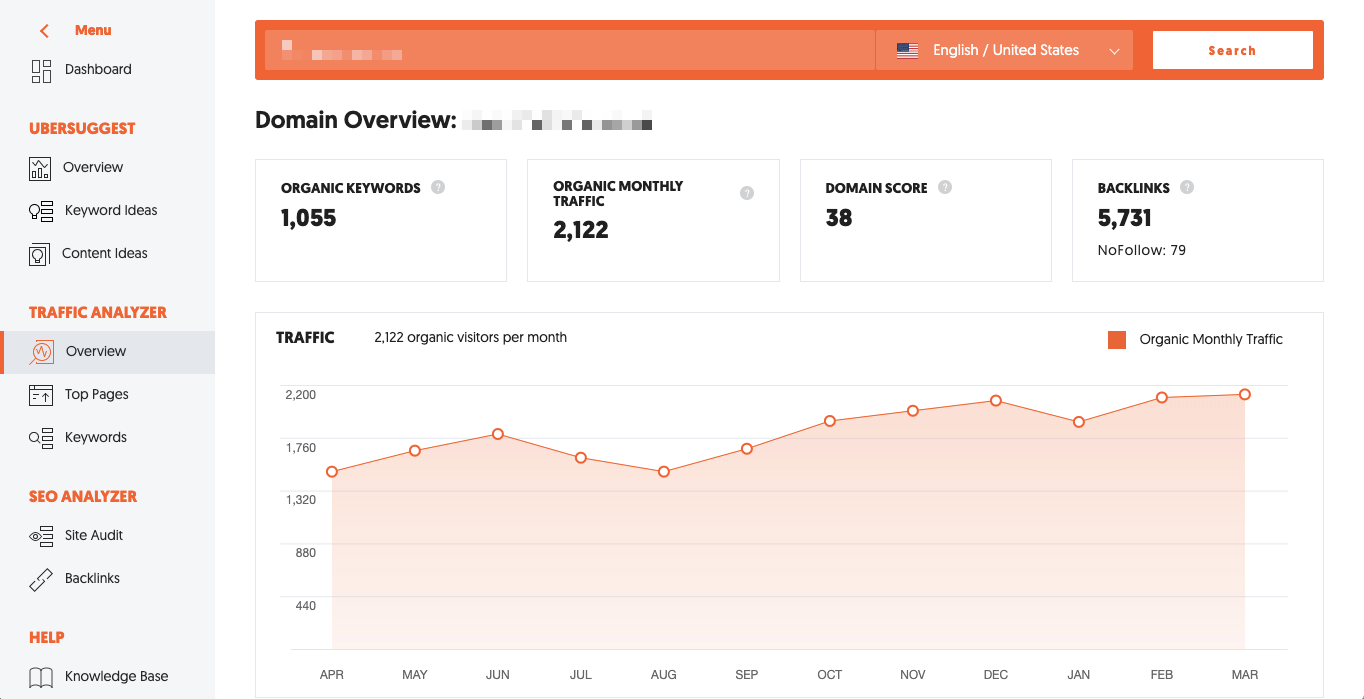
SEO Link Tools
Maintaining accurate on-page links and efficient navigation on a site is important.
Additionally, maintaining an authoritative backlink profile is important for your site’s authority.
22. Ahrefs’ Backlink Checker
Backlinks from high-quality domains are wanted by anyone tracking SEO, but low-quality backlinks can hurt the SEO authority of a site. Ahrefs’ Backlink Checker has an enormous catalog of links, making it easy to check up to 100 links to the target URL so marketers can disavow any that they don’t want. In addition, this tool has an intuitive user interface, and is updated every 15 minutes.
23. Check My Links
Check My Links is a Chrome extension used extensively by web designers and content creators. The tool crawls site pages and identifies broken links on the site. Check My Links will copy these broken links to a clipboard to give the user an opportunity to update them to new or working links as needed. This can be helpful for cleaning up a site’s UX and providing updated information to boost the authority of content.
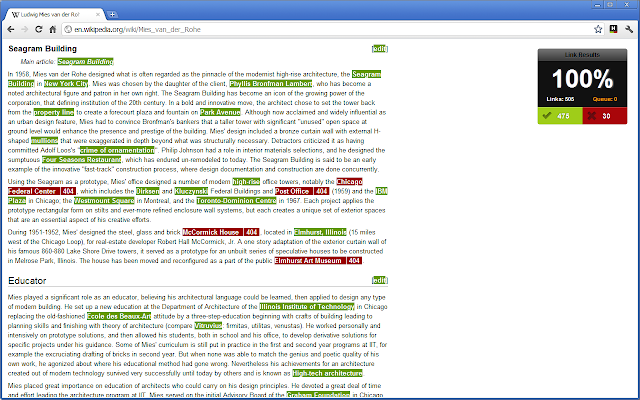
24. MozBar
MozBar is a free browser extension that reveals the domain and page authority of each site a user views. By simply typing in a URL, users can see how a site measures up in terms of domain and subdomain authority, as well as link profiles.
Rank Tracking Tools
Rank tracking in and of itself is largely a vanity metric for SEO, but these tools use organic rankings as a means to an strategic end. While watching daily or weekly ranking changes is usually a fruitless exercise, organic rankings are usually helpful for understanding what content users (and Google) are looking for.
25. CanIRank
CanIRank breaks down the differences between a user’s page and the first site in organic search results. CanIRank has a layer of machine learning intelligence to present personalized recommendations that can help to move a site to the top of the SERP.
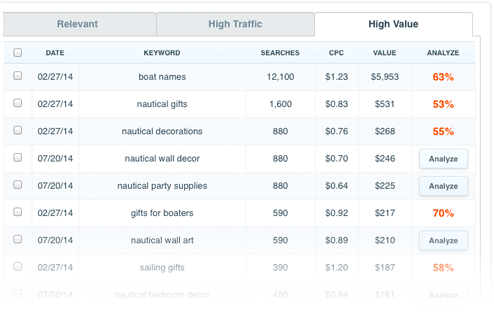
26. Search Latte
Search Latte is especially helpful for sites that need to know how they are ranking internationally. Search Latte does not require a proxy or VPN to access the results of a different country’s Google search results.
Users can test various combinations of keywords to discover the top level domain by country and language. This will help them to compete for organic traffic in a search landscape with which they are not as familiar.
27. WooRank
Competitive analysis is WooRank’s specialty. It provides a “marketing checklist,” analyzing title tags, mobile optimization, and site speed.
At the same time, Woorank ascertains a competitors’ SERP rankings, social media pages, site traffic, and any unusual technology used on their sites. WooRank continuously checks competitors’ ranking, but also provides historical performance.
Site Speed Tools
Increasing site speed improves UX. For example, conversions drop by 20% for every one second delay in mobile page load times. Google understands that users prefer faster sites, which means Google prefers faster sites. And that means you need a good site speed tool.
28. Cloudflare
Cloudflare incorporates content delivery networks (CDN), domain name systems (DNS), and distributed denial of service (DDoS) protection to safeguard sites and provide users with the information they need quickly.
These three elements of Cloudflare are free, but even more features are available in the pro edition.
29. Google PageSpeed Insights
Google’s PageSpeed Insights can aid anyone in optimizing their website for speed. It is accessible via any browser and warns users when their site is slow. If this is the case, PageSpeed Insights will offer hints and best practices for speeding things up.
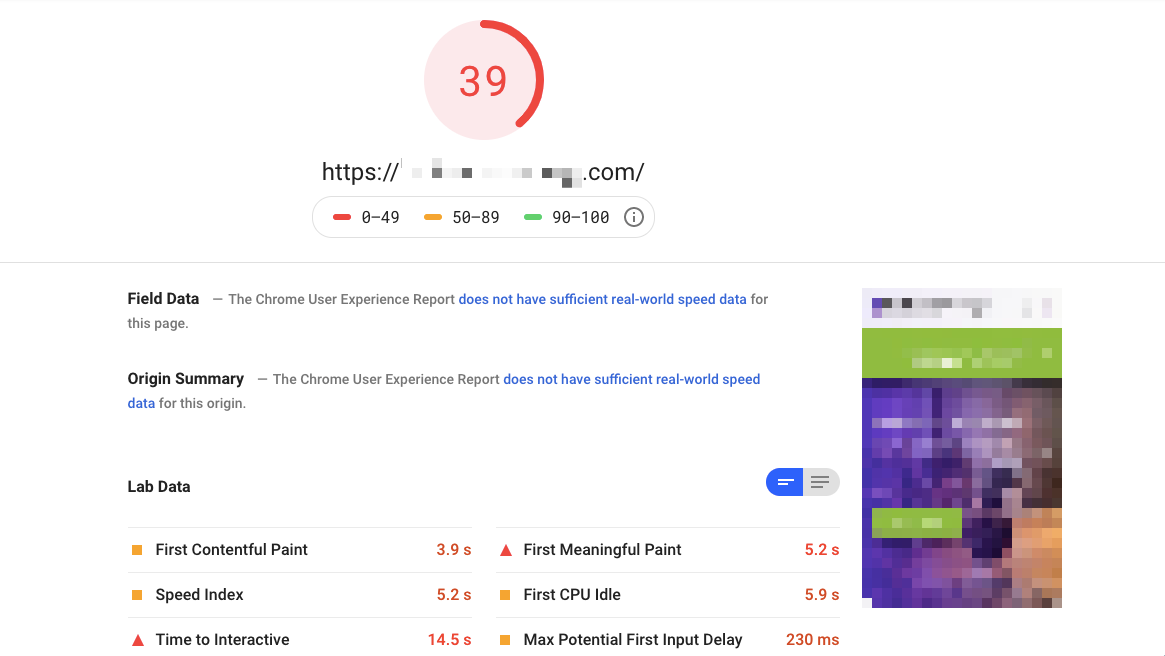
30. GTmetrix
GTmetrix acts like an objective proxy, measuring the time it takes to load a website. GTMetrix actually utilizes Google PageSpeed Insights, Waterfalls, and YSlow to compile a full report on a site’s speed.
Besides a current state analysis, GTmetrix will help users visualize historic load speed data for each page.
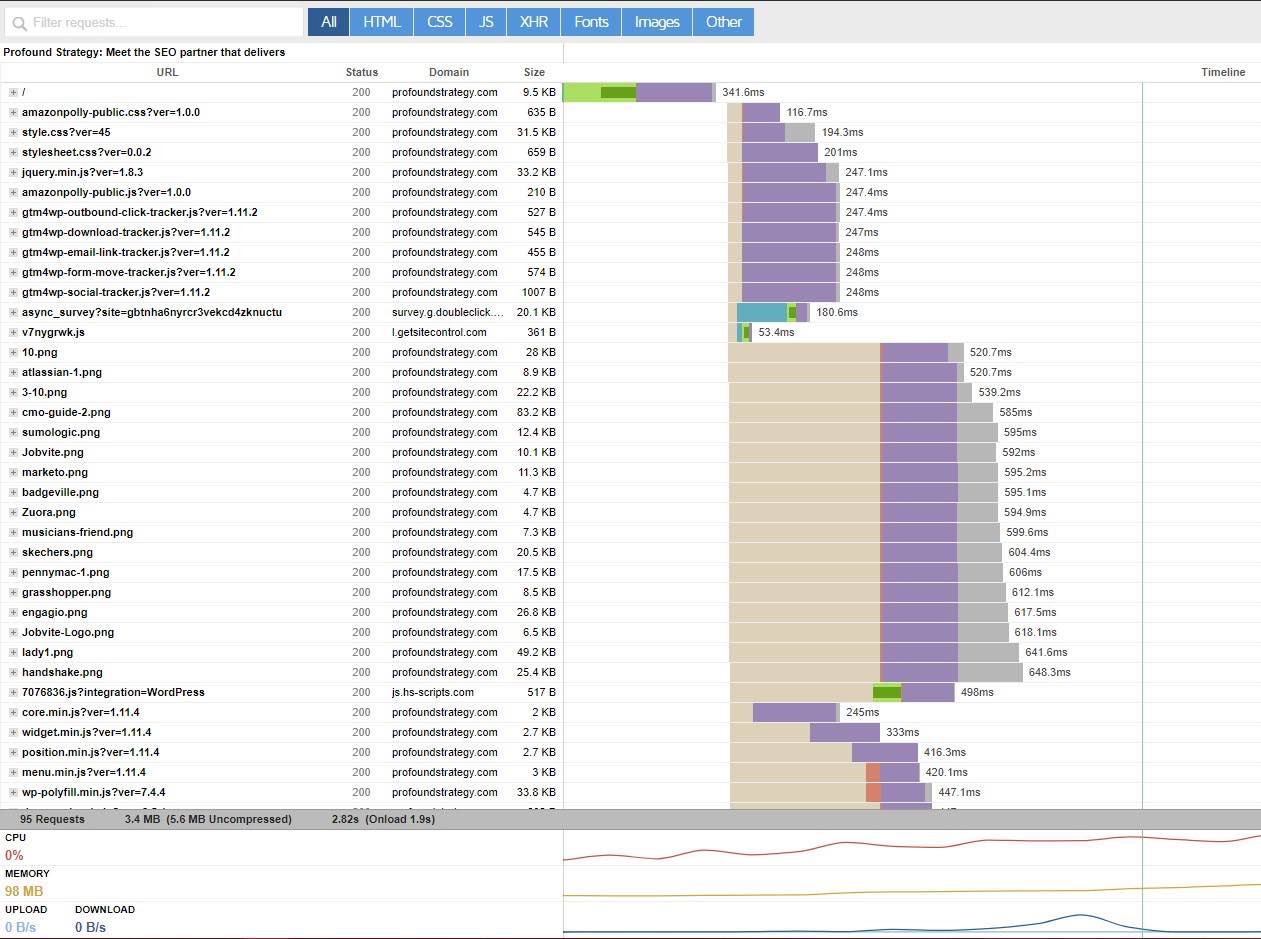
31. Lighthouse
In addition to PageSpeed Insights, Google has an open-source auditing tool for improving web page quality. Lighthouse specializes in scaling page performance, accessibility, and compatibility. It is one of the most updated tools for evaluating mobile page speed.
Technical SEO
Technical SEO doesn’t drive organic traffic growth like it used to, but the right issues remain a bedrock for earning organic traffic. Establishing and maintaining the baseline, technical SEO requirements allows companies to focus on growing organic traffic through content creation.
32. Browseo
Unbeknownst to some, search engine spiders have a starkly different view of websites than humans do. Browseo displays how a site appears in SERP from the perspective of a search engine spider. This web app analyzes a site’s structure and highlights pieces of pages that are relevant for SEO (i.e. links of the page, headings, words on the page, etc).
33. Chrome DevTools
Chrome DevTools is a simple, built-in web authoring and debugging feature of Google Chrome. DevTools can help to conduct an SEO audit with Javascript auditing, on-page SEO, and site speed analysis.
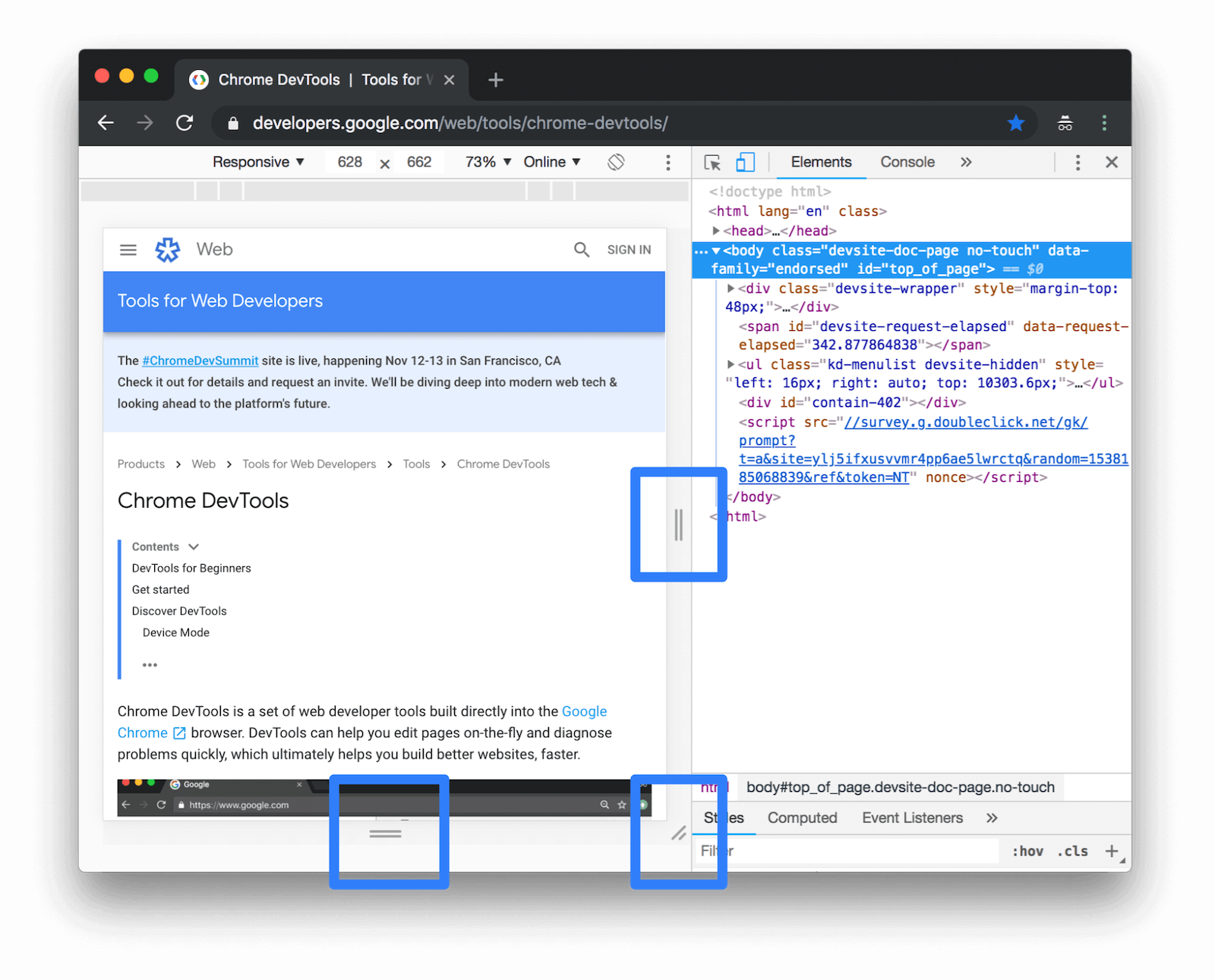
DevTools’ “Device Mode” allows users to easily toggle to a mobile view on a desktop device.
34. Mobile Friendly Test
Google has its own Mobile Friendly Test that is incredibly simple to use. Just type in the URL of your (or any) site, and get a simple yes/no verdict on whether Google thinks that site is mobile friendly.
You’ll also get a mobile screenshot, a list of any page loading issues, and links to additional resources to help make the site more compatible with mobile devices.
35. MozCast
MozCast is not necessarily a tool, but it is an interesting and helpful overview of the organic search landscape.
Monitoring day-to-day algorithm changes is tedious and unnecessary, but MozCast provides a quick overview of what might be happening with Google. You can also get a quick overview of trends in SERPs and organic rankings over time.
36. SEOquake
A Chrome plug-in, SEOquake offers organic research data, and is highly customizable. With SEOquake, users can perform on-page audits, domain comparison, and data exports.
Additional tools in SEOquake include internal/external link analysis, keyword density report, social metrics, and a full SEO audit.
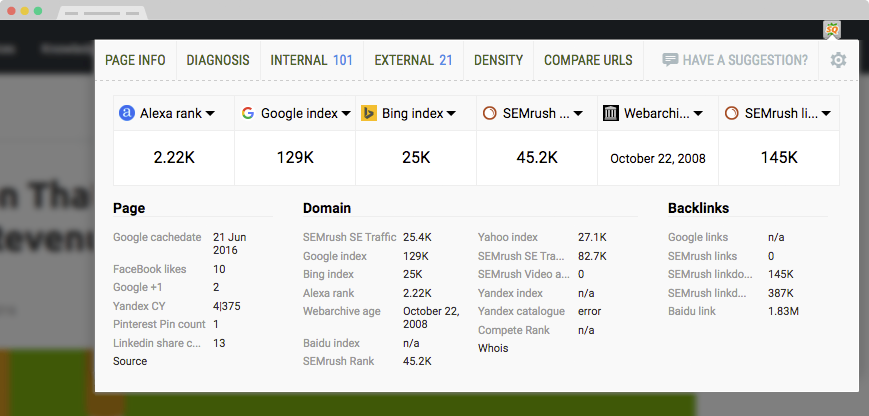
37. Yoast SEO
Yoast SEO is a WordPress plugin that allows users to optimize meta tags, link elements, and edit dozens of pages at the same time. Additionally, Yoast will send alerts to enable permalinks and increase a site’s overall readability.
Profound Strategy’s Preferred SEO Tools
Profound Strategy has used many tools over the years, and have naturally pruned our tool kit to those most helpful. There are no affiliate links or business partnerships involved in these recommendations. These tools are just the ones that we find to be most helpful to us.

38. DeepCrawl
Large sites that require frequent updates need an application that can scan and crawl every page. Not only does DeepCrawl do this, it also produces a report with the number of non-indexed pages and H1 tags on each page. Moreover, it notifies users of broken internal and external links.
Check it out: DeepCrawl (Subscription-based)
Google Analytics, Search Console, and Data Studio
We can all admit that Google owns the search space. As such, its tools are the best around—for small to midsize businesses as well as enterprises. For instance, Search Console is the only way to know the true number of clicks and impressions per keyword.
Google’s Data Studio is also one of the most powerful platforms for presenting data to team members and executives. As an agency, we create standard templates for reporting that all of our clients can utilize. We also customize these reports to meet various customer needs. Additionally, templates are free and not overly complex.
Check it out: Google Marketing Platform
QueText
Hiring writers always presents the risk of plagiarism. QueText’s DeepSearch technology helps to verify that our writers’ work is unique and not recycled. What is more, QueText supplies users with citations to include for quotes from other sources.
Screaming Frog
Profound Strategy uses Screaming Frog to crawl for key elements of an SEO audit. Screaming Frog SEO Log File Analyzer determines how and when search engine bots from Google and Bing interact with a site. This technology is particularly beneficial for our customers who run sites with thousands of pages.
SEMrush
For keyword ranking and search volume, look no further than SEMrush. We use SEMrush for keyword analysis, competitive analyses, historical trends, and so much more.
39. STAT
It can be difficult to tell a user’s intention by the keywords they type into a search engine, especially when investigating high volume terms that represent various needs. To give supporting context for keyword research, STAT tracks features on Google search history, like knowledge graph, People also ask, and news.
STAT is a strong ranking tool, because it concentrates exclusively on the background and reasons for a user’s search. Be aware, STAT is not free, which is why it was not previously listed.
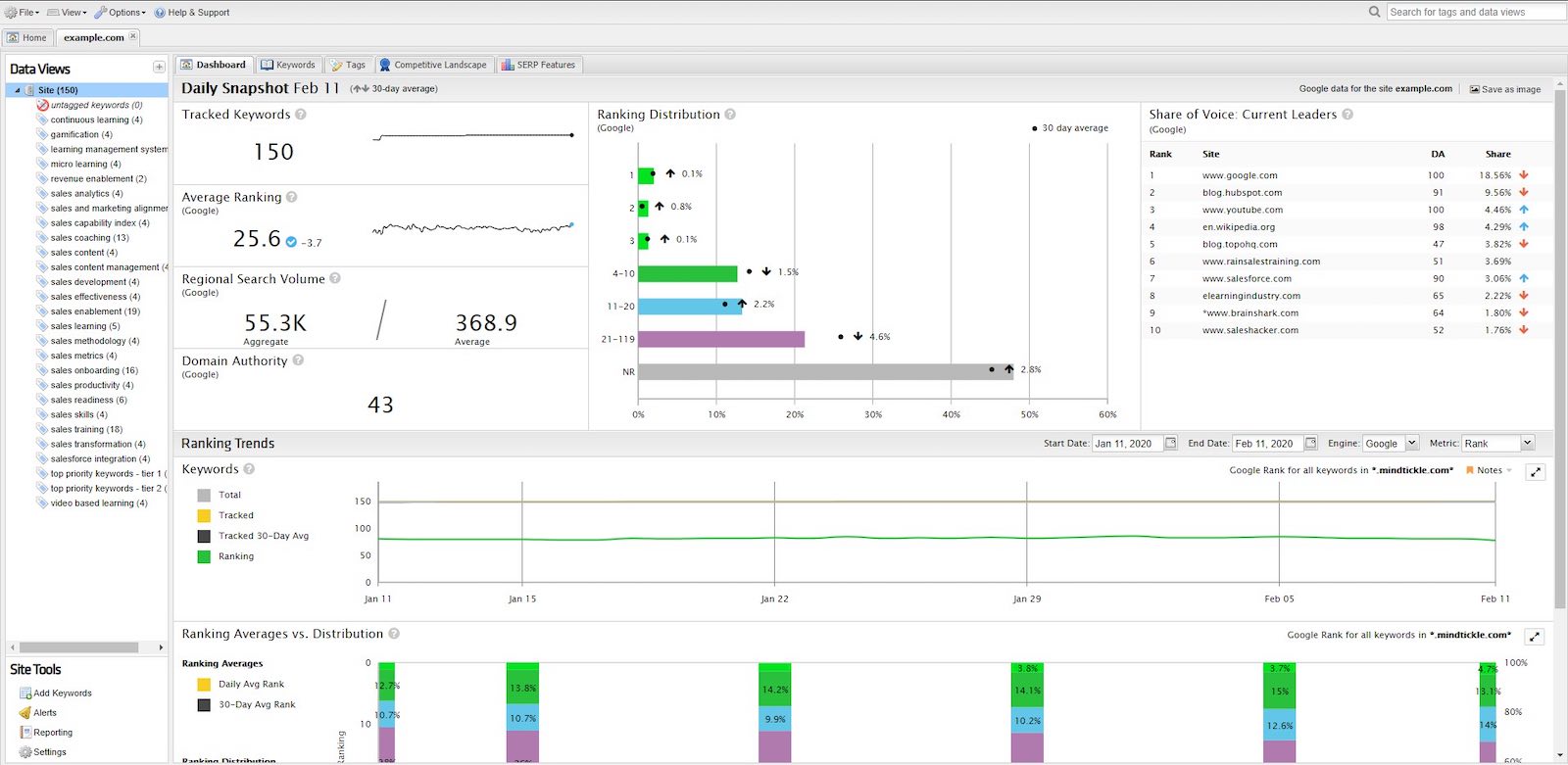
40. WP Engine
WP Engine is Profound Strategy’s preferred hosting provider, because it offers the strongest foundation for SEO. As a matter of fact, our own WordPress site is hosted on WP Engine, and every client whose site we have moved to WP Engine has loaded two or more seconds faster with no other changes.
Besides speed, WP Engine has excellent management capabilities in the Admin portal, and allows users to create multiple development environments for testing. Additionally, WP Engine has backup points in case work gets lost, and an award-winning customer support system.
WP Engine also makes it easy to manage several sites. It automatically updates plugins and tests for every update. WP Engine has never failed us.
Check it out: WP Engine
Gaining an SEO advantage today
Finding the right SEO tools from hundreds of options can be complicated, but making the leap is worth it. With the right SEO tools, companies can see exactly what their competition is doing, how their own site is performing, and home in on the issues that will make a difference.
Being smart about the tool sets used, and learning to be effective with them, gives companies an immediate leg up in SEO rankings.
If it all seems like too much, a great SEO partner can fill in any gaps. Profound Strategy’s passionate SEO strategists clarify a company’s brand, generate more leads, deliver on KPIs, and routinely exceed expectations.
If you’re ready to take your SEO to the next level, but don’t have time to build a toolkit yourself, we’re ready to help.
